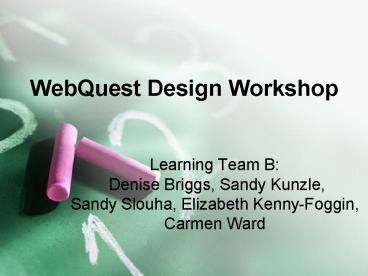WebQuest Design Workshop - PowerPoint PPT Presentation
1 / 15
Title:
WebQuest Design Workshop
Description:
Title: WebQuest Design Workshop Author: Mother Last modified by: Slouha Created Date: 3/9/2005 3:56:19 PM Document presentation format: On-screen Show – PowerPoint PPT presentation
Number of Views:188
Avg rating:3.0/5.0
Title: WebQuest Design Workshop
1
WebQuest Design Workshop
- Learning Team B
- Denise Briggs, Sandy Kunzle,
- Sandy Slouha, Elizabeth Kenny-Foggin,
- Carmen Ward
2
What is a WebQuest?
- An inquiry-oriented activity where students
interact with resources on the Internet. - Students engage higher level thinking processes
using a sound teaching strategy designed to
engage students in discussion and learning.
3
Benefits to Students
- Self-discovery through a defined learning
process. - Actively involved in the lessons.
- Utilization of critical thinking skills.
4
Benefits to Teachers
- Increases/improves independent learning
- Creates additional teacher time with at-risk
students - Evaluative measure to assess student growth.
5
Six Stages of WebQuest
- Introduction Orientates learners and raises
awareness of topic. - Task Describes activity and final outcomes.
- Resources Provides links to be used for the
activity. - Process Outlines steps of the activity.
- Evaluation Explains grading or assessment of
activity. - Conclusion Reminds learners of purpose and
outcomes
6
Selection of a Topic
- Should be based on a curriculum standard(s)
- Increases utilization of the Internet for inquiry
purposes - Requires a level of understanding, not just rote
learning
7
INTRODUCTION
- State your objectives
- Generates students interest.
- Written informally to help student navigate
through webquest with ease.
8
TASK
- Clearly defines students goals and expectations.
- Step by step directions are provided for clarity
and ease of webquest
9
Task Design
- Retelling
- Compilation
- Mystery
- Journalistic
- Design
- Creative Product
- Consensus Building
- Persuasion
- Self-Knowledge
- Analytical
- Judgment
- Scientific
10
PROCESS
- This section provides guided practice.
- Students are instructed on how to complete the
task and steps needed in order to complete
webquest. - Students independently begin webquest
11
Designing the Process
- Create your webquest based on the student
population in your class - Identify a topic of interest to students
- Determine roles and responsibilities of students
- The PROCESS section is where most of the external
web sites will be linked. - Design the PROCESS so the students engage in a
natural flow of learning
12
RESOURCES
- The specific materials needed to complete the
webquest. - The specific websites required to complete the
task.
13
EVALUATION
- Clearly defined assessment of the webquest
- Expectations of grading policy required prior to
starting webquest
14
Develop A Rubric
- Complex tasks require multidimensional
measurement. For example, the use of multiple
choice tests would not be sufficient - Writing the rubric standards prior to presenting
the web quest helps to identify key points to be
graded. It is not uncommon to revise your task
after thinking about your evaluation.
15
CONCLUSION
- The summary of what the students have
accomplished. - Students can reflect upon the process and what
they have learned.































